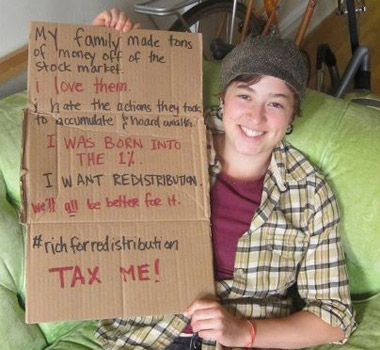Earlier this month, an estimated 700 Occupy Wall Street protesters were arrested while attempting to cross New York’s famed Brooklyn Bridge. It was one of the largest demonstrations to date by the amorphous “Other 99 percent” representing the majority of people who don’t benefit from the socioeconomic privileges enjoyed by the upper 1 percent of wealth holders in the country.
But among the protesters arrested was Northampton native Jessie Spector, who marched that day holding a most unusual sign: “I was born into the 1%, I want redistribution, we’ll all be better for it & Tax me!”
Why would Spector do this?
“I wanted to mix up the message,” she explains. “It’s important to show there are rich people in solidarity.”
An alum of Smith College Campus School, JFK Middle School and Northampton High, Spector’s supportive family—her father is Northampton City Councilor Paul Spector—still lives in the Valley, where she hopes to move back someday.
“My family made tons of money off of the stock market,” her protest sign explains. “I love them, [but] I hate the actions they took to accumulate and hoard wealth.”
For Spector, the pervasive issues of economic injustice to which the Occupy Wall Street protests have (eventually, finally) brought national media attention are not just personal. They are professional, too.
Spector works as the program director of Resource Generation, a nonprofit that “organizes young people with financial wealth to leverage resources and privilege for social change,” as their website notes. Some in the Resource Generation community make a large salary, some have inherited money, and some have insider access to people or institutions of power, whether in philanthropy, politics or the financial sector.
Since 1998, Resource Generation has challenged more than 1,000 of these affluent young adults to speak out against the system from which they benefit.
“We’re working with [another economic justice organization] Wealth for the Common Good to create a Tumblr page where those in the 1 percent can explain why they stand with the 99 percent,” Spector says, referencing the “We Are the 99 Percent” Tumblr page posted by Occupy Wall Street. “It will be like the ‘It Gets Better’ videos,” she continues. “Anyone will be able to post.”
They hope to get the support of famous personalities like Matt Damon, Russell Simmons, and other well-known, wealthy celebrities who have spoken out against economic injustice.
For Spector, supporting the movement as an affluent activist means more than offering financial aid. “Open solidarity is key,” she explains. “The most important thing we do at Resource Generation is to get people of privilege to speak out.”
It was inevitable that Spector, who lives in New York, works at Resource Generation, and is already engaged in the fight for economic justice, would take part in the Occupy Wall Street protests. The day before she was arrested, she headed down to the now-famous Zuccotti Park for the first time.
“It was festive,” she says. “There was a lot of drumming and chanting.”
Spector found her way to the section of the park lined with signs. Noticing one that read, “Make less than $250k? Then you need to be on this side!!!” she added a small addendum: “Make more than $250k? You should also be on this side!”
Spector was aware that she and her wealthy comrades might be greeted with skepticism by the protesters. But almost without exception, their solidarity was welcomed. The politicized residents of Zuccotti Park were overwhelmingly supportive, and intrigued. “People mouthed ‘Thank you’ numerous times,” she reports.
The gesture was much appreciated by Spector and her activist friends, she says: “We went there hoping to show that rich people can be allies.”
It is a task to which both she and Resource Generation have dedicated themselves over the years, and which she hopes will have major implications for the way wealth impacts the power dynamics of our society in the decades to come.
According to the Center on Wealth and Philanthropy at Boston College, “a[n intergenerational] wealth transfer of at least $41 trillion will take place in the United States by the year 2052.” That is a striking amount of capital already invested in the most economically privileged among us—an investment that Resource Generation hopes to change.
“In 2006,” the organization’s webpage on Social Change Giving reads, “$2.3 billion of foundation funding went to progressive social change out of a total o $19.1 billion in giving, or less than 12 percent.”
For Resource Generation, this means that most charitable giving is not creating equitable social change, but rather is keeping the power and influence where it already is, tiered toward the upper 1 percent of wealth holders.
“We organize to transform philanthropy, policy and institutions,” reads the Resource Generation website, “and leverage our collective power to make lasting structural change.”
That’s the kind of change Spector hopes is happening with Occupy Wall Street, which, with its various committees dividing the responsibilities of providing protesters with food, medicine, and various necessities like sleeping bags and tents, has thus far functioned in a remarkably non-hierarchical manner.
“It was interesting to see the organization of the protesters,” she says. “No one was intentionally being racist or sexist, but those dynamics would inadvertently play themselves out anyway. But when people interrupted the organizers to point this out, they were very open to listening, and to changing.”
It is this dynamic that Spector believes is a central strength of the Occupy Wall Street protests, and is a key ingredient for a broad-based, cross-class economic justice movement as well.
“The potential for real change is huge if we can learn and grow and shift,” she urges. “Once we start talking, we can really start moving on this.”



